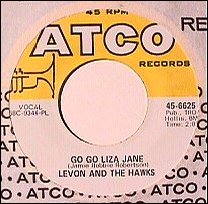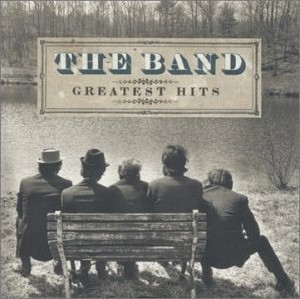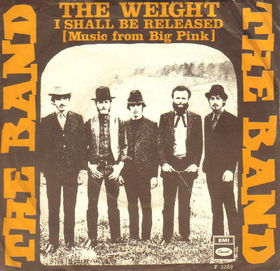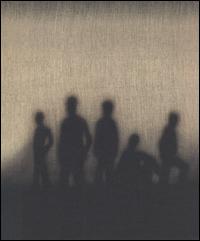
The Band was a Canadian-American rock group formed in Toronto, Ontario, in 1967. It consisted of four Canadians, one Englishman, one American: Rick Danko, Garth Hudson, Richard Manuel, Robbie Robertson, and Levon Helm. The Band combined elements of Americana, folk, rock, jazz, country, and R&B, influencing subsequent musicians such as the Eagles, Elton John, the Grateful Dead, the Flaming Lips, and Wilco.

Eric Garth Hudson is a Canadian multi-instrumentalist. As the organist, saxophonist and accordionist for Canadian-American rock group the Band, he was a principal architect of the group's sound. Hudson has been called "the most brilliant organist in the rock world" by Keyboard magazine. With the deaths of Richard Manuel in 1986, Rick Danko in 1999, and Levon Helm in 2012, Hudson is one of only two living original members of The Band, the other being Robbie Robertson.

Rock of Ages: The Band in Concert is a live album by the Band, released in 1972. It was compiled from recordings made during their series of shows at the Academy of Music in New York City, from December 28 through December 31, 1971. It peaked at #6 on the Billboard 200 chart, and was certified a gold record by the RIAA. An expanded release of recordings taken from the same series of shows, called Live at the Academy of Music 1971, was released in 2013.

Northern Lights – Southern Cross is the sixth studio album by Canadian-American rock group the Band, released in 1975. It was the first album to be recorded at their new California studio, Shangri-La, and the first album of all new material since 1971's Cahoots. All eight songs are credited as compositions of guitarist Robbie Robertson.

Jubilation is the tenth and final studio album by Canadian/American rock group the Band. Recorded in the spring of 1998 in Levon Helm's home studio in Woodstock, New York, it was released on September 15, 1998. For the first time since the group reformed without guitarist and songwriter Robbie Robertson, there were more originals than covers. Songs include "Last Train to Memphis", featuring guest guitarist Eric Clapton, Garth Hudson's solo instrumental closer "French Girls", Rick Danko's "High Cotton" and the ode to Ronnie Hawkins, "White Cadillac".

"Go Go Liza Jane" was the A-side of the 1968 single released by Atco Records in order to capitalize on the growing success of The Band, who had recorded the track along with two others in 1965 under the moniker Levon and the Hawks. The song, an upbeat version of the traditional "Little Liza Jane", demonstrated, three years before their debut LP, the way in which the voices of the singers in The Band, Rick Danko, Richard Manuel and Levon Helm, meshed so brilliantly.

Greatest Hits is a compilation album by the Canadian-American rock group The Band. It was released in 2000 on Capitol Records. The album was released in conjunction with remastered versions of the group's first four albums. It draws very heavily from these records, with thirteen of the eighteen tracks selected from Music from Big Pink, The Band, Stage Fright and Cahoots.

To Kingdom Come: The Definitive Collection is an anthology by Canadian-American rock band the Band, released in 1989. The thirty-one tracks were mostly taken from the group's eight albums on Capitol Records. The group's better-known songs, such as "The Weight", "Up on Cripple Creek", "Chest Fever", "The Night They Drove Old Dixie Down", "The Shape I'm In", "Life Is a Carnival" and "It Makes No Difference", are all present. Rarities such as "Loving You Is Sweeter Than Ever", "Get Up Jake" and "Back to Memphis" are also present.

"The Weight" is an original song by the Canadian-American group The Band that was released as a single in 1968 and on the group's debut album Music from Big Pink. Written by Band member Robbie Robertson, the song is about a visitor's experiences in a town mentioned in the lyric's first line as Nazareth. "The Weight" has significantly influenced American popular music, having been listed as No. 41 on Rolling Stone's 500 Greatest Songs of All Time published in 2004. Pitchfork Media named it the 13th best song of the Sixties, and the Rock and Roll Hall of Fame named it one of the 500 Songs that Shaped Rock and Roll. PBS, which broadcast performances of the song in Ramble at the Ryman (2011), Austin City Limits (2012), and Quick Hits (2012), describes it as "a masterpiece of Biblical allusions, enigmatic lines and iconic characters" and notes its enduring popularity as "an essential part of the American songbook."

A Musical History is the second box set to anthologize Canadian-American rock group The Band. Released by Capitol Records on September 27, 2005, it features 111 tracks spread over five compact discs and one DVD. Roughly spanning the group's journey from 1961 to 1977, from their days behind Ronnie Hawkins and Bob Dylan through the departure of Robbie Robertson and the first disbanding of the group. The set includes highlights from each of the group's first seven studio albums and both major live recordings and nearly forty rare or previously unreleased performances.
"Chest Fever" is a song recorded by the Band on its 1968 debut, Music from Big Pink. It is, according to Peter Viney, a historian of the group, "the Big Pink track that has appeared on most subsequent live albums and compilations", second only to "The Weight". The music for the piece was written by guitarist Robbie Robertson. Total authorship is typically credited solely to Robertson, although the lyrics, according to Levon Helm, were originally improvised by Levon Helm and Richard Manuel, telling the story of a man who becomes sick when he is spurned by the woman he loves.
"King Harvest " is a song by The Band, which originally appeared as the final track on their second album, The Band.

"Stage Fright" is the title track of the Band's third album, Stage Fright. It features Rick Danko on lead vocals and was written by Robbie Robertson. According to author Barney Hoskyns, Robertson originally intended it to be sung by Richard Manuel but it became clear that the song was better suited to Danko's "nervous, tremulous voice."

"Life is a Carnival" is the opening track of the Band's fourth album, Cahoots. Written by Rick Danko, Levon Helm, and Robbie Robertson, the song features horn arrangements by New Orleans musician Allen Toussaint. The song is the only track from the Cahoots album included on the original releases of Rock of Ages and The Last Waltz. The song was featured in the Bill Murray movie Larger Than Life.
"It Makes No Difference" is a song written by Robbie Robertson and sung by Rick Danko that was first released by The Band on their 1975 album Northern Lights – Southern Cross. It has also appeared on live and compilation albums, including the soundtrack to the film The Last Waltz. Among the artists that have covered the song are Solomon Burke, My Morning Jacket and Over the Rhine.

"The Shape I'm In" is a song by The Band, first released on their 1970 album Stage Fright. It was written by Robbie Robertson, who did little to disguise the fact that the song's sense of dread and dissolution was about Richard Manuel, the song's principal singer. It became a regular feature in their concert repertoire, appearing on their live albums Rock of Ages, Before the Flood, and The Last Waltz. Author Neil Minturn described the song as "straightforward rock." Along with "The Weight," it is one of the Band's songs most performed by other artists. It has been recorded by Bo Diddley, The Good Brothers, The Mekons, The Pointer Sisters, She & Him, and Marty Stuart.
Lonesome Suzie is a 1968 song by The Band written and sung by Richard Manuel originally appearing on their influential debut album Music From Big Pink It was also released on Across The Great Divide, a compilation box set from 1994. Drummer Levon Helm has said that "...Lonesome Suzie was Richard's failed attempt to write a hit record." It never charted and is one of the few songs on which Manuel contributed writing, but is also recognized as one of Manuel's signature pieces. In 1970 it was released as the B-side of the French single release of "Whispering Pines".
"Sleeping" is a song by The Band, first released on their 1970 album Stage Fright. It was also released as the B-side to the "Stage Fright" single. It was co-written by Robbie Robertson and Richard Manuel. This and “Just Another Whistle Stop” are the only two songs Manuel receives credit for on the album. Music critic Barney Hoskyns rates it as "one of Richard [Manuel's] liveliest performances" and "one of The Band's most intricate arrangements." The Band never featured the song on a live album.

"Ophelia" is a song written by Robbie Robertson that was first released by The Band on their 1975 album Northern Lights – Southern Cross. It was the lead single from the album. It has also appeared on several of the group's live and compilation albums, and has been covered by such artists as Vince Gill and My Morning Jacket.
"Jemima Surrender" is a song written by Levon Helm and Robbie Robertson. It was first released on the Band's self-titled album in 1969. Usual Band drummer Levon Helm played guitar and sang the lead vocal while usual Band pianist Richard Manuel played drums. The song's lasciviousness helped inspire Naomi Weisstein to form the Chicago Women's Liberation Rock Band.














